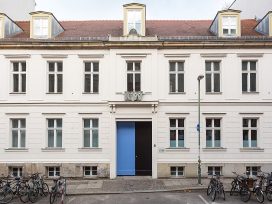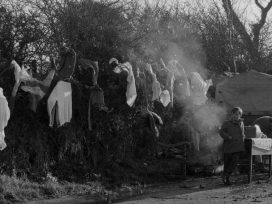Since the flawed elections and the ensuing violent crackdown on 19 December 2010, the Belarusian regime has been waging a war against the country’s independent media. According to the regime’s Minister of Information and former head of its Ideological Department, Alaksandr Pralaskouski, “Belarus has become an information battlefield”. Our president warns of a “fierce information war” being waged against the country. But it is the state that launched the attack. Of the more than 700 people arrested and assaulted on 19 December, Election Night, more than 30 were journalists; others reporting on the peaceful demonstration had their cameras and other equipment confiscated and smashed. Seven members of the Belarusian Association of Journalists are currently being tried as criminals, accused of taking part in “mass riots” and actions that “violate the public order”.
There have already been casualties in this “battle”. Alaksandr Atroshchankau, a web-journalist and a spokesperson for the former presidential candidate Andrei Sannikau, has been sentenced to four years imprisonment. Sannikau himself got five years. Journalist and civil activist Dzmitry Bandarenka has received two years. All sentences are in maximum security prisons. Natallia Radzina, the head of Charter 97, one of Belarus’ most popular opposition websites, has fled the country and asked for political asylum in Europe. Irina Khalip, international award winner and Sannikau’s wife, was handed a two-year suspended prison term. Pavel Severynets, one of Belarus’ most eloquent opposition writers and journalists, has refused to utter a word in protest of his show trial and received a 3-year sentence of “restricted freedom”. And Hrodna-based journalist Andrzej Paczobut, a member of the Polish minority and correspondent for Poland’s second largest daily, Gazeta Wyborcza, was arrested in April and is awaiting trial on charges of “defaming the President of Belarus”.
Following a carefully laid out strategy of attack, the KGB (the secret police are still called that in Belarus) has raided more than a dozen editorial offices and journalists’ private apartments since the elections. Over 114 pieces of professional media equipment have been seized. A tea kettle was the only electronic device left in the editorial offices of the local newspaper Borisovskiye Novosti after a raid in January. Yet its next issue was published on time, thanks to assistance from colleagues and readers. And when the office of Nasha Niva, Belarus’ oldest independent newspaper, was stripped of all its equipment, more than 40 computers were donated by readers.
The Ministry of Information is allied with the KGB and Prosecutor’s Office in striking at independent voices. Autoradio, a popular private FM station, was deprived its broadcast license for allegedly disseminating information that “contained public appeals for extremist activities.” Both Nasha Niva and Narodnaya Vola, Belarus’ best selling independent paper, have received numerous official warnings for their coverage of the election campaign and bomb explosion in a Minsk subway station on 11 April 2011, and consequently are now facing closure.
Nevertheless, the regime is losing its war on objective information and the truth. Not a single independent newspaper or website has surrendered and stopped publishing because of the raids. The attacks on independent media are nothing more than manifestations of a faltering regime that is fearful of losing its popularity amidst a sudden economic and political crisis. With little room for international manoeuvre after its shameful election and cruel crackdown, the regime is lashing out against what it calls “fifth columns” and “foreign enemies”. But the more the authorities try to cut off access to independent information, the more that citizens seek to obtain it.
The few independent newspapers allowed to be distributed in state kiosks sell out immediately. At the end of 2010, the news and information websites were getting 1.6 million Belarusian readers – 47 per cent of the country’s entire Internet audience. In 2010, the readership of eight leading independent news and information sites grew by 82 per cent, compared to an 18 per cent overall increase in Belarus’ Internet audience.
Internet penetration has grown from a quarter to almost half of the population in five years. The number of broadband subscribers rose from 11 400 in 2006 to 1.8 million in January 2011. Every day more than 400 000 Belarusians visit Internet news sites, equalling the size of the daily audience of a state TV channel. While losing some of the impressive gains in readership in the immediate aftermath of the election and crackdown, independent news and information web sources continue to serve larger audiences than they did before 19 December. Following the 11 April bomb blast, hits on independent web sites skyrocketed, indicating that citizens do not rely on state media, which is more like war-time propaganda these days.
As the information battle rages, it is not surprising that the government is calling for greater media regulation, especially of the Internet. But even if the regime manages to destroy all independent newspapers and cuts off all independent websites, it will not be able to defeat the independent voices who will continue to speak out via underground publications, cross-border radio and satellite TV and social networking sites. Facing a united, determined and battle-hardened independent media community numbering some 3.5 million regular Internet users, and confronted with growing credibility gap, the state propaganda machine has already lost the fight to fence in Belarusians behind an informational iron curtain.
There continues to be an expansion of information flows across borders. One poll conducted in 2010 found that at least 10 per cent of Belarusians had satellite dishes and that 19 per cent had the opportunity to watch satellite television. Of those watching satellite TV last year, 66 per cent preferred watching news over any other type of programme. Among the top 25 satellite channels watched last year in Belarus were Euronews (#2), BBC (#19) and CNN (#25). The cross-border Belarusian satellite television channel BelSat is watched regularly or occasionally by nearly 930 000 people. In 2010, the number of BelSat viewers doubled.
A December 2010 public opinion poll found that trust in the independent media has increased by 9 per cent since the 2006 election, while trust in the state media has declined, despite ever growing levels of state funding. Yet at a recent international media fair in Minsk, in which 600 media entities from eight countries took part, not a single Belarusian independent media outlet was allowed to participate.
While political persecution and economic discrimination remain the main problems confronting independent media in Belarus today, there are also a number of serious challenges that will influence the ongoing media war.
The first is “thin ranks” – an online generation gap. It is often said that wars are fought by young people. In Belarus, 15 to 34 year olds are the “foot soldiers” of the Belarusian Internet, comprising 65 per cent of the audience. But the typical reader of a news and information website is more the officer type – a 35 year old, married, middle class male with a higher education. Young people are “absent without leave,” just not interested in the news. They mainly hang out in social networks. There are over 2 million Belarusian users on Vkontakte alone. The Facebook population is growing rapidly and has doubled since November 2010; it now counts 280 000 users in Belarus. Belarusians still comprise one of the biggest armies on Livejournal, with over 600 000 users. Young people are also a driving force behind numerous online cultural and social projects that “make love, not war”. These websites are small or medium in size but produce a lot of creative ideas, especially how to use new media to promote freedom of expression. But while there is lots of creative energy and anti-establishment insubordination, these sites do not usually transform young people into offline “antiwar activists”. The question is how to encourage young people to be more interested in online news and information, rather than deserting the struggle for the sake of entertainment, and how to link traditional media with Web 2.0 more closely.
A second challenge is the lack “trained soldiers,” due to the low quality of professional training for journalists, which remains in the Soviet mould and is driven by propaganda. On top of this comes the stigma of the profession (being an independent journalist in Belarus is dangerous and the gains don’t always outweigh the risks) and the hard field conditions for the independent media. Moreover, freelancing is not legally allowed in Belarus. Those who work for independent media are overwhelmed and rarely have the luxury to specialize or focus on a specific issue or field. Those who work for the state media follow orders about what to write and are subject to self- or editorial censorship. As a result, talented young journalists, writers, photographers, artists and designers are looking and leaving for better career opportunities abroad, especially in Moscow and Kyiv.
The final challenge is being cut off from journalist allies in the international media community. Being in constant struggle with an authoritarian regime and surviving in very tough political and economic battlefield conditions makes it harder for the Belarusian media to look beyond today’s fight, to follow new trends and to think about future developments. It is therefore very important that Belarusian editors and journalists are invited to and participate in meetings and professional networks such as Eurozine, to share experiences with their colleagues from different countries, and sometimes just to be inspired and get over our battle fatigue.
I apologize for all of my references to conflict. I am small and not very threatening. But my colleagues and I do feel like we are under siege. We are fighting the good fight with our computers and publications to preserve freedom of expression in Belarus. It is the government that started this fight and we hope that there will be a truce soon, or at least a ceasefire. Thank you for the opportunity to report from the media battlefield that is today’s Belarus. I hope that very soon we will be able to discuss how independent media helped bring a peaceful victory for the democratic forces in my country.







